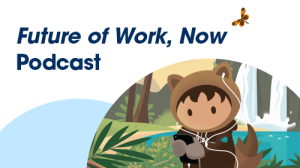Growing up in a liberal household in Pakistan, Dr Ayesha Khanna was aware of the inequity in society and felt a responsibility to do something about it. Joining us on the Future of Work, Now podcast, Dr Khanna shared how these principles have influenced her career and led her to complete a PhD focused on smart cities.
Today, Dr Khanna is CEO of ADDO AI, a specialist data science and artificial intelligence (AI) firm. ADDO AI provides advice and implements data platforms for customers in Asia, the Middle East, and the US. She is also Founder of 21C Girls (21st Century Girls), a registered charity that teaches coding and artificial intelligence to girls and women in Singapore.
In her conversation with podcast host Jess O’Reilly, Dr Khanna offers insight into her work and provides advice on how to maximise the benefits of AI.
Here are highlights from the conversation:
Machines are the new team players
Over time, technology has moved from the back office to the front office. Now, technology and business teams work closer together. However, there’s a new team player today and that’s the machine.
“There’s the business person, there’s the technology person, and now there is the machine itself. We have to learn to work with these new influences, whether it’s an AI agent that supports you in your daily decision-making, or a robot in your warehouse,” said Dr Khanna.
Treating AI like a colleague doesn’t mean believing everything it says. On the contrary, Dr Khanna, says it is okay to question what it tells you. The important thing is to listen.
“Think about your normal office relationships. Your colleague will say something and you could be quite open to it or your instinct may tell you that it won’t work for your business. That is precisely how we work with humans and how we must work with machines. We have to be open to AI’s recommendations and experiment, but we also have to be critical and question the recommendations,” said Dr Khanna.
Building skills and confidence in AI
AI projects typically require data scientists and AI engineers, as well as experts in areas like natural language processing (NLP). Dr Khanna said there had previously been a shortage of skills in these areas, but growing interest in AI could help close the talent gap. In addition, solutions like Tableau CRM could lessen the need for large teams of data experts.
“Where existing AI products can be used, then your job is to connect the dots. You don’t need to be a deep AI expert for that. You can have just a small team or have an advisory team who can come in and create a little bit of custom code. I think we’ll see more of this in the future,” said Dr Khanna.
Asked about the skills required for the future of work and AI, Dr Khanna said it was important for everyone to be computationally literate.
“The ability to read and write, do basic math and recognise basic coding is fundamental to understanding how the world around you works. Without that, you lose confidence,” said Dr Khanna. “There are many fabulous people who shrink back in board meetings, for example, as they don’t understand how technology is disrupting their business. It is unfair to them and unfair to their employer and employees as they have a responsibility to learn what’s necessary about the world around them.”
Empowering women in tech
Through her charity 21C Girls, Dr Khanna is now empowering the next generation with the skills and confidence to succeed in the future of work. She was raised to believe that she could do anything, and started the charity because she wanted other girls to believe the same.
The charity now works with the Infocomm Media Development Authority (IMDA) and Google in Singapore to teach boys and girls how to code. “The kids love it. They learn the basics of coding, but also problem solving through coding and that really is the key. Coding is another language to solve problems just like writing music or painting is a language to express your creativity,” said Dr Khanna.
Dr Khanna also runs the Empower Program with Ngee Ann Polytechnic in Singapore. This program teaches girls the basics of AI and the feedback has shown it to be successful in building confidence about the future.
“It’s very important we put in that work to upskill ourselves and be fearless. AI and technology is not rocket science. You can learn the basics and sometimes the basics are all that you need. So I encourage everyone— especially girls and women— to pick up that book or take that course and learn,” said Dr Khanna.
Listen to the full podcast for more on Dr Khanna’s career journey and her perspectives on the future of AI.
Access the podcast on demand at our podcasts page, Spotify, and iTunes. You can also listen over at the Singapore Community Radio Twitch page, Facebook page, and website.
Tune in at 1:00 p.m. SGT Friday, April 30 to hear from Suraj Naik, CMO and Board Member of the Genius Group.
Sign up here for our Salesforce Asia Blog newsletter to get monthly updates on the latest Salesforce stories.





















![[Illustration] An AI agent provides B2B customer service](https://www.salesforce.com/ap/blog/wp-content/uploads/sites/8/2024/12/B2B-AI-Agents-1680x1120-1.jpg?w=150&h=150&crop=1&quality=75)



